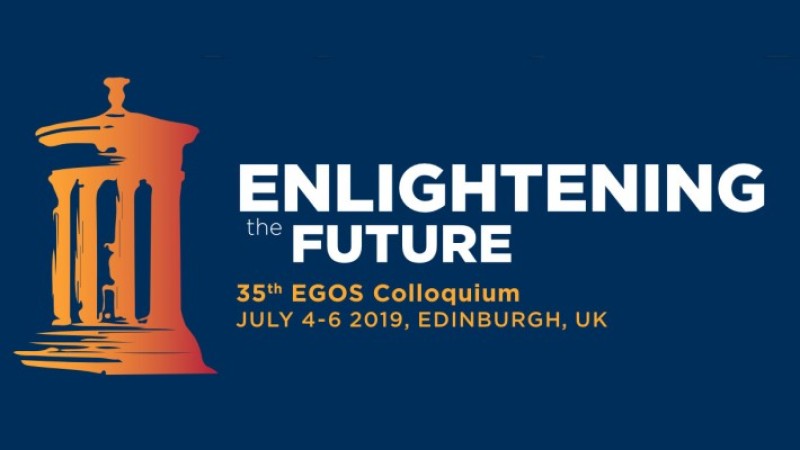Sub-theme 01: [SWG] Organization & Time: Organizing in the Nexus between Short and Distant Futures
Call for Papers
Contemporary organizations operate increasingly according to a logic of speed and instantaneity while also shortening their
temporal horizons. These pressures are exogenous features of organizational environment, but they also involve an endogenous
component arising from the recursive relationship between organizational action and the evolving context (Perlow at al., 2002).
In everyday organizational practices, actors produce and reproduce a variety of temporal structures, which in return shape
the temporal rhythm and form of these practices (Orlikowski & Yates, 2002; Karmowska et al., 2017). Recent works in organization
studies have begun the search for ways to analytically and empirically handle the temporal complexity faced by organizational
actors in these processes (Hussenot & Missonier, 2016).
Time forms an inseparable part of every human
experience, where past and future are reflected in the present (Heidegger, 1962). In order to grasp the temporal nature of
organizational phenomena it is necessary to consider how the organization’s existence is a reflection of both the past and
the anticipation of the future (George & Jones, 2000; Hernes, 2014). While often falling prey to short-termism, organizations
are increasingly challenged to address distant pasts and futures (Schultz & Hernes, 2013). In this sub-theme, we aim to
discuss the nexus between, on the one hand, the demands of speed and adaptions and, on the other hand, the challenges of addressing
distant futures. We make the assumption that if most organizations become too short term, they will compromise employee welfare,
organizational success, and societal well-being (Polman, 2014; Slawinski & Bansal, 2015).
This sub-theme
is intended to provide the opportunity for organizational scholars to appreciate the temporal qualities of their research
phenomena and to position their work within the broader studies on time and organizations. We are open to variety of approaches
to studying organization and time as we strive to identify and build more comprehensive theoretical frameworks on the subject.
Our goal is to build an inclusive conversation that appeals to many theories and methods within organizational theory and
practice.
In keeping with the EGOS 2019 Colloquium theme, we are particularly interested in the temporal
aspects that contribute to insights and understanding with a focus on a better future for societies and organizations. Studies
across industries and markets are invited at micro- as well as macro-levels of analysis. We also invite diverse philosophical
methods and concepts as well as methods of enquiry that permit the temporal nature of organizational processes and practices
to be captured. Both conceptual and empirical contributions are welcome.
Papers may address, but are not
limited to the following themes:
How experience and inheritance of the past (plus anticipation of the future) affect the framing of the present in organizations and shape organizational change
How organizational time perspectives influence organizational efforts to address societal grand challenges
Organizational outcomes of temporal myopia or short-termism
Relationship between growing inter-connectedness and acceleration in organizational life and their effect on long-term thinking
Consequences of the growing disharmony between natural and organizationally-imposed temporal rhythms
Dynamics between on-going temporal structures in organizations and distant futures
Continuity, change and distant futures
Connecting distant pasts and distant futures: challenges and dilemmas
Organizational power and politics in the nexus between short- and long-term thinking
Organizational history: conflict and mediation mechanisms
Learning and organizational forgetting over time
Interpretations of time in organizational culture
Philosophical concepts and methodological dilemmas in studying time in organizations
References
- George, J.M., & Jones, G.R. (2000): “The role of time in theory and theory building.” Journal of Management, 26 (4), 657–684.
- Heidegger, M. (1962): Being and Time. New York: Harper & Row.
- Hernes, T. (2014): A Process Theory of Organization. Oxford: Oxford University Press.
- Hussenot, A., & Missonier, S. (2016): “Encompassing novelty and stability: An events-based approach.” Organization Studies, 37 (4), 523–546.
- Karmowska, J., Child, J., & James, P. (2017): “A contingency analysis of precarious organizational temporariness.” British Journal of Management, 28 (2), 213–230.
- Orlikowski, W.J., & Yates, J. (2002): “It’s about time: Temporal structuring in organizations.” Organization Science, 13 (6), 684–700.
- Perlow, L.A., Okhuysen, G.A., & Repenning, N.P. (2002): “The speed trap: Exploring the relationship between decision making and remporal context.” Academy of Management Journal, 45 (5), 931–955.
- Polman, P. (2014): “Business, society, and the future of capitalism.” Available at: https://www.mckinsey.com/business-functions/sustainability-and-resource-productivity/our-insights/business-society-and-the-future-of-capitalism
- Schultz, M., & Hernes, T. (2013): “A temporal perspective on organizational identity.” Organization Science, 24 (1), 1–21.
- Slawinski, N., & Bansal, P. (2015): “Short on time: Intertemporal tensions in business sustainability.” Organization Science, 26 (2), 531–549.


